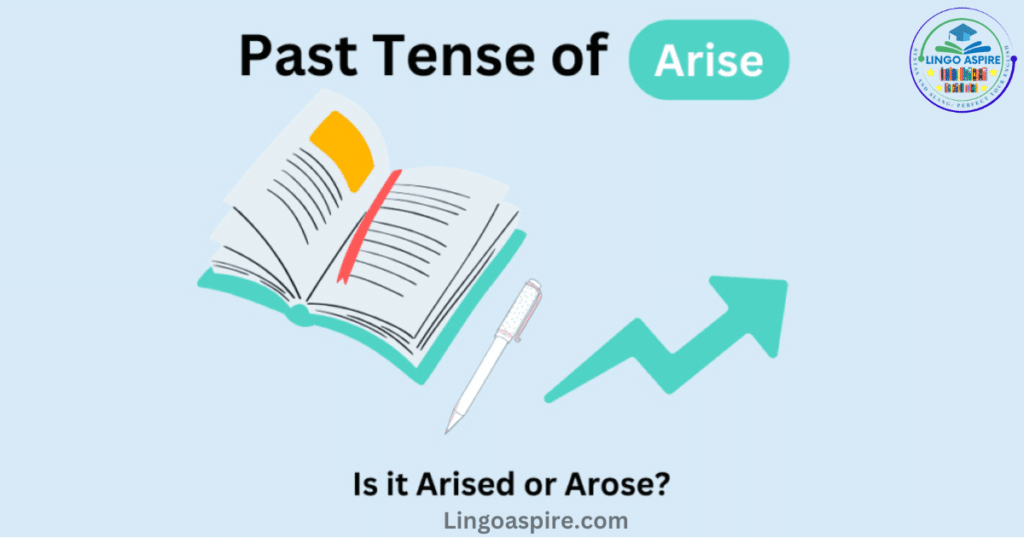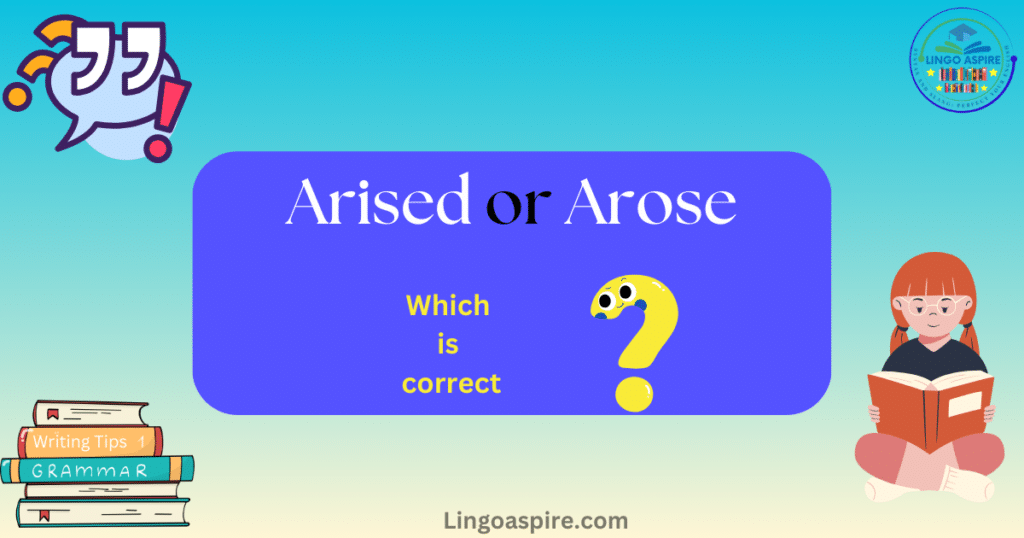In English, the past tense can often be a field of confusion, especially with irregular verbs like “arise.” Many learners find themselves tripping over whether to use arised or arose. This article will clarify this common misconception, ensuring you walk away with a solid understanding of how to use this verb correctly.
Understanding ‘Arise’: Definition and Usage
The verb arise plays a crucial role in English and is often used to describe the initiation of an action or the occurrence of a situation. For instance, one might say, “Questions arose during the meeting.” The beauty of this verb lies in its ability to neatly encapsulate the emergence of scenarios or actions without the clutter of extra words. This simplicity is essential for clear communication, yet it brings with it the complexity of its grammatical forms.
Historical Evolution of ‘Arise’
Delving into the etymology of “arise,” we uncover its roots in Old English as arīsan, which means to get up or stand up. This historical backdrop not only enriches our understanding of the verb’s usage but also its transformation over centuries. Understanding its origins illuminates why “arose” evolved as the past tense rather than “arised,” adhering to patterns of sound change and grammatical consistency observed in English development.
Grammatical Rules: Conjugating ‘Arise’
Arise is an irregular verb, which means it does not follow the typical -ed ending found in regular verbs. The conjugation of “arise” is “arise” in the present, “arose” in the simple past, and “arisen” as the past participle. This irregularity is a relic of English’s Germanic ancestry, which includes a slew of verbs that change vowels in their past forms.
Why ‘Arose’ and Not ‘Arised’?
Grammatically, “arised” does not exist in contemporary English. The correct past tense is “arose,” a form that has been used since the Middle Ages. This distinction is crucial in avoiding errors in written and spoken English. Using “arose” correctly also helps maintain the verb’s powerful brevity and clarity in past-tense narratives.
Comparative Analysis: ‘Arise’ vs. ‘Rise’
While “arise” and “rise” might seem similar, they function differently. “Rise” can mean to move upward physically, as in “The balloon rose in the air,” whereas “arise” is used for more abstract or non-physical emergencies. This comparison is vital for English learners to grasp the nuances of each verb and apply them correctly in diverse contexts.
Practical Applications and Examples
To embed the correct usage of “arose” in your language repertoire, consider these contexts:
- In casual conversation: “A problem arose with the plan, so we need a new one.”
- In academic writing: “Several theories arose about the phenomenon, each differing in its assumptions.”
- In professional communication: “During the audit, several issues arose that require immediate attention.”
Each example showcases the verb’s adaptability to different situations, emphasizing its utility across various forms of communication.
Uses of Arised or Arose

Certainly! Below is an expanded table showing the verb “arise” conjugated in all major tenses, including detailed examples to illustrate its usage in each context. This comprehensive approach helps clarify how “arise” functions in different grammatical structures, enhancing your mastery of English verb tenses.
| Tense | Form | Example |
|---|---|---|
| Simple Present | Arise | In meetings, issues often arise unexpectedly. |
| Simple Past | Arose | Yesterday, a surprising question arose during the discussion. |
| Simple Future | Will arise | More challenges will likely arise as we proceed. |
| Present Continuous | Am/is/are arising | He is arising from the chair as we speak, ready to greet the guests. |
| Past Continuous | Were/were arising | While we were discussing, further complications were arising. |
| Future Continuous | Will be arising | Tomorrow at this time, new ideas will be arising during our brainstorming session. |
| Present Perfect | Have/has arisen | Since joining the team, she has arisen to the occasion numerous times. |
| Past Perfect | Had arisen | By the time we arrived, the sun had arisen. |
| Future Perfect | Will have arisen | By the end of the decade, we will have arisen to a leading position in the industry. |
| Present Perfect Continuous | Have/has been arising | She has been rising at dawn to meditate every day for the past year. |
| Past Perfect Continuous | Had been arising | He had been arising early to study for exams before he graduated. |
| Future Perfect Continuous | Will have been arising | By next month, they will have been arising at 5 AM for training for over a year. |
This table provides a clear view of how the verb “arise” adapts to different tenses, illustrating the flexibility and complexity of English verb conjugation.
Examples of Arised or Arose in Sentences

Certainly! Here are detailed examples showing the use of “arise” and “arose” in sentences, demonstrating the different contexts in which each form can be effectively applied:
Examples Using “Arise”
- In a Business Meeting:
- Example: “Whenever we encounter an obstacle, creative solutions often arise from our brainstorming sessions.”
- In a Novel:
- Example: “As the plot thickens, unexpected conflicts arise that challenge the protagonist’s resolve.”
- In Academic Discussions:
- Example: “During his research, new questions arise that push the boundaries of current scientific understanding.”
- In Everyday Situations:
- Example: “Common issues that arise in daily life often require quick and practical solutions.”
- In Legal Contexts:
- Example: “Legal issues arise when parties disagree on contract terms.”
Examples Using “Arose”
- In Historical Context:
- Example: “As civilizations developed, new forms of government arose that influenced global political structures.”
- In Personal Narratives:
- Example: “When she faced adversity, her innate courage arose and she overcame the challenges.”
- In Nature Documentaries:
- Example: “As dawn broke over the savannah, a sense of calm arose among the grazing animals.”
- In Mystery Novels:
- Example: “Mysterious circumstances arose that led the detective to reconsider his initial suspects.”
- In Philosophical Debates:
- Example: “During our discussion, an interesting point arose about the nature of free will.”
These examples illustrate the versatility of “arise” and “arose” across various genres and contexts, helping to reinforce their proper use in both present and past tense forms.
Synonyms and Related Terms of Arised or Arose
To enhance your understanding of the verb “arise” and its usage, here’s a detailed table of synonyms for both “arise” and its past tense form “arose.” These synonyms not only offer alternatives but also provide subtle nuances in meaning that can be used in different contexts:
| Verb Form | Synonyms | Contextual Usage |
|---|---|---|
| Arise | Emerge, Occur, Surface, Transpire | Emerge is often used when something comes into view or becomes apparent, especially after being hidden. Occur refers to something that happens, especially something unexpected. Surface can imply coming to attention after being concealed. Transpire is typically used in formal contexts to indicate that something has happened. |
| Arose | Surfaced, Emerged, Sprang Up, Came About | Surfaced is used similarly to arise, often for issues or complications that become clear after being hidden. Emerged is suitable for situations or things that come into existence or attention. Sprang-up implies a sudden or quick appearance. Came about is a more general term that refers to how situations or events develop. |
This table provides a rich palette of linguistic choices, enabling you to select the most appropriate synonym based on the context of your writing or conversation. Each synonym carries its connotations and typical uses, allowing for precise and varied expression in English.
Conclusion
Understanding when and how to use “arise” and “arose” is more than just a grammatical exercise—it enhances your ability to communicate effectively and accurately. Whether in writing or speech, mastering these forms ensures clarity and precision, hallmarks of proficient English usage.
This exploration not only clarifies the correct past tense of “arise” but also deepens your appreciation for the intricacies of English grammar. Armed with this knowledge, you can confidently face any linguistic challenge, knowing you have the tools to choose the right word for every situation.
Sources
Here are some detailed sources with links that provide comprehensive information on the verb “arise” and its conjugation, as well as general insights into English grammar:
- English Grammar Textbooks: “Practical English Usage” by Michael Swan is a staple for anyone studying or teaching English grammar. It covers a wide range of topics, including verb tenses and irregular verbs.
- Online Language Education Platforms: Purdue University’s Online Writing Lab (OWL) offers free resources on grammar, including detailed explanations of verb tenses and usage.
- Historical Linguistics Research: “The Cambridge History of the English Language” provides in-depth insights into the evolution of English, including its verbs.







